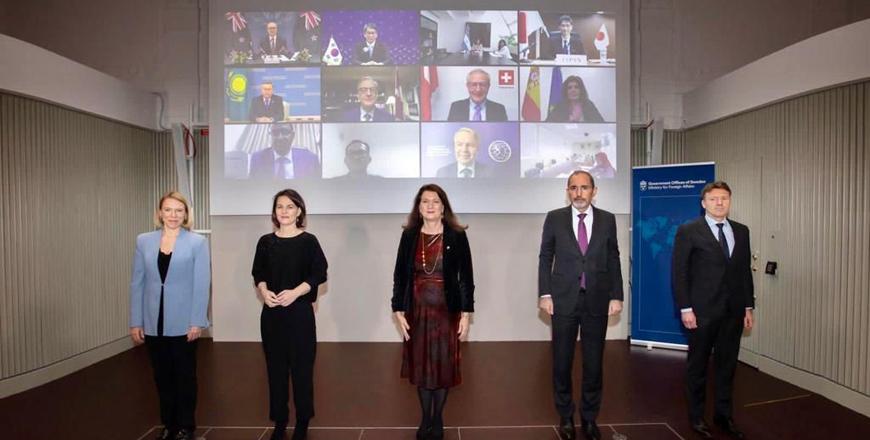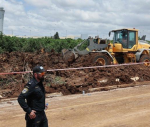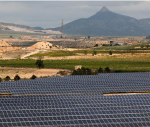You are here
‘Jordan, Kazakhstan share vision of world peace’
By Mohammad Ghazal - Jun 22,2016 - Last updated at Jun 22,2016
AMMAN — As Kazakhstan celebrates 25 years since it renounced its nuclear arsenal, officials and diplomats say Jordan and Kazakhstan see eye-to-eye when it comes to working towards a nuclear-free world.
Kazakhstan permanently closed the Semipalatinsk Nuclear Test Site in 1991, the first and the only such country to take this step.
Diplomats, officials and law experts say Jordan and Kazakhstan share a common vision about global issues and are key players in initiatives and efforts to push for a world free of nuclear weapons.
The two countries have also led initiatives to protect the image of Islam amid attempts by terrorist groups to tarnish the image of the religion.
“His Majesty King Abdullah and Kazakh President Nursultan Nazarbayev share a great vision and are playing a key role at international arenas in adopting initiatives and leading major efforts to ensure non-proliferation of nuclear weapons,” former Jordanian ambassador to Kazakhstan Suleiman Arabyat said.
“The two countries are strong advocates of global peace,” Arabyat told The Jordan Times in a recent interview.
“Kazakhstan calls for a Central Asia that is free of nuclear weapons and Jordan calls for a Middle East that is free of such weapons. The two countries strongly cooperate and coordinate efforts to ensure a world that is free of nuclear weapons,” the former diplomat said.
Kazakhstan voluntarily renounced its arsenal of nuclear weapons — once the fourth largest in the world.
Thanks to Kazakhstan’s efforts, August 29 is now commemorated by the UN as the International Day against Nuclear Tests, Arabyat noted.
Kazakhstan, seen as an economic success story, has also been a key player in the fields of global peace-building and security and development, the officials and diplomats said, adding that Jordan and Kazakhstan have led several efforts to defend the image of moderate Islam.
The country has launched the Conference on Interaction and Confidence-Building Measures in Asia and the triennial Congress of Leaders of World and Traditional Religions.
On December 7, 2015, the UN General Assembly adopted the Universal Declaration for the Achievement of a Nuclear-Weapons-Free World proposed by Kazakhstan.
Muna Makhamreh, coordinator at Parliamentarians for Nuclear Non-Proliferation and Disarmament (PNND), noted that Kazakhstan gained its independence the same year it renounced its nuclear arsenal.
“When Kazakhstan gained its independence, it had the choice of keeping a strong nuclear arsenal. At that time, Kazakhstan was at a critical stage,” Makhamreh said in an interview.
“But … the nation opted for peace and its independence was linked with peace and giving up nuclear power,” she told The Jordan Times.
“Kazakhstan and Jordan are role models to be followed in the world in this regard,” said Makhamreh.
She also highlighted the significance of Kazakhstan’s establishment of the Low-Enriched Uranium Bank under an agreement with the International Atomic Energy Agency.
The bank allows all countries wishing to develop and use peaceful nuclear energy to do so without violating the non-proliferation regime.
Addressing the 4th Nuclear Security Summit in the US, Nazarbayev referred to a manifesto he presented at the meeting at the Carnegie Endowment for International Peace.
In the manifesto titled “The World: 21st Century”, the Kazakh leader called for the adoption of a comprehensive programme to ensure a world without war in the 21st century.
It is important to adapt a regime of non-proliferation and disarmament to contemporary conditions by including into it all the de jure and de facto nuclear states, he said in his address at the summit attended by leaders from across the globe.
“Renunciation of war and nuclear weapons would be an act of supreme wisdom of humanity in the 21st century. Now, under the auspices of the UN, there is a need to create a counter-terrorism global network with the participation of all nations of the world,” said the Kazakh president.
Jordanian Senator Salwa Damen-Masri, who is also co-president of the PNND, noted that Jordan has exerted similar efforts on the global stage in its efforts against nuclear weapons.
“Jordan under the leadership of His Majesty King Abdullah plays a fundamental role in pushing for a world free of nuclear weapons,” said Damen-Masri, highlighting the King’s recent participation in the Nuclear Security Summit in Washington.
“Jordan and Kazakhstan represent a model to be followed in their cooperation in this arena as they both are key advocates of initiatives to promote global sustainable development through peace,” the senator noted , adding that some $100 billion is spent on nuclear weapons per year.
Jordan is signatory to a joint action plan with Washington to combat the smuggling of nuclear and radioactive materials.
The plan aims to strengthen Jordan’s capacity to detect and prevent attempts to smuggle these materials.
The plan is part of King Abdullah’s initiative to strengthen the world’s capacity to stop the smuggling of these dangerous materials, launched during his participation in nuclear security summits in Seoul and the Hague in 2012 and 2014 respectively.
The King’s initiative was supported by 39 countries as well as international organisations.
‘Cooperation in defending Islam’
The Jordanian officials and experts also said Jordan and Kazakhstan stand out for their efforts to protect the image of Islam and to uproot radicalism and terrorism.
“Jordan and Kazakhstan launched several initiatives to defend Islam and promote moderation,” said Arabyat.
“Astana hosts several international events on this issue and Jordan effectively supports and participates in all such initiatives and events,” the former diplomat said.
During the 70th session of the UN General Assembly in September in 2015, Nazarbayev called for creating an international anti-terrorist network under the umbrella of the United Nations.
“There is strong security cooperation between Jordan and Kazakhstan in efforts to build global peace and uproot terrorism,” said Arabyat.
He added that Jordan is an active supporter of interreligious dialogue, ethnic and religious tolerance and peaceful coexistence, citing the “Amman Message” and the “World Interfaith Harmony Week”.
Kazakhstan, which is home to more than 130 ethnic groups, is also home to the Congress of Leaders of World and Traditional Religions that regularly hosts events with the participation of scholars from across the world to promote dialogue and coexistence.
“The congress and Amman Message are in tune,” said Arabyat. The two countries’ initiatives in this regard function as a platform to strengthen the constructive dialogue between civilisations and religions.
‘More room for cooperation’
For Jordan and Kazakhstan, which established diplomatic ties in 1993, the door remains wide open for increased cooperation in the areas of agriculture, tourism, science, technology and education, among others.
“Kazakhstan is witnessing massive development in various areas and its economy is witnessing increased growth,” said Damen-Masri.
“Jordan has great potential to engage in more partnerships and projects with Kazakhstan,” the senator added.
“The relations between the two countries and their leaders are very close and strategic and definitely the two countries can do more to... join ranks in addressing regional and global issues of concern to all,” she said.
The Kazakh president visited Jordan in 2006 and 2009, while King Abdullah has visited Kazakhstan five times in the last 11 years.
In 2010, a street in Amman was named after Nazarbayev, and in 2014 a street in Astana was officially named after the late King Hussein.
To shed light on mutual ties between Kazakhstan and other countries, the Ministry of foreign affairs of Kazakhstan is holding its third “Kazakhstan through the Eyes of Foreign Media” competition.
The competition is held in partnership with JSC “NC “Kazakhstan Temir Zholy”, the National Olympic Committee of the Republic of Kazakhstan and the Rixos President Astana, among others.
Related Articles
AMMAN — The Jordan Times’ Mohammad Ghazal on Wednesday was among the winners of Kazakhstan’s third international journalism contest that awa
AMMAN — Deputy Prime Minister and Foreign Minister Ayman Safadi on Tuesday emphasised the Kingdom's support for talks in Vienna aimed to rev
AMMAN — His Majesty King Abdullah and Kazakh President Nursultan Nazarbayev on Wednesday held talks in Astana that focused on enhancing rela


















